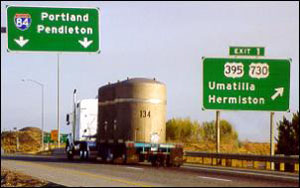Carlsbad Field Office - Tribal Program
Shipments to the Waste Isolation Pilot Plant (WIPP) travel through 10 Native American Reservations (among six states) along the transportation routes. The U.S. Department of Energy’s (DOE) Carlsbad Field Office’s (CBFO) Tribal Program enhances the safe transportation of transuranic waste shipments to WIPP across tribal lands, while strengthening tribes’ capabilities where they have jurisdiction.

The CBFO Tribal Program offers formal government-to-government agreements with each tribe. Routine agency coordination and work is conducted with designated tribal emergency response officials, such as fire and police officials. Some tribes have also hired environmental management or industrial development officials to assist the tribes with their programs.
The amended WIPP Land Withdrawal Act states DOE’s obligation to provide financial assistance, technical assistance and training for emergency preparedness to tribes on the designated WIPP routes. This is accomplished through formal agreements, made independently with each tribe, recognizing their sovereignty and respecting their rights in a government-to-government relationship.
The agreements are legal contracting instruments used to provide funds annually for use in preparing for transportation-related emergencies, according to each tribe’s own identified needs and goals. The agreements also serve as two-way conduits, promoting participation in DOE’s decision-making relating to transuranic waste transportation activities.
The specific scope of each agreement is determined in close cooperation with each tribe. Activities usually include:
Accident prevention
Transportation monitoring
Communications
Identification of safe parking and alternate routing
Emergency preparedness
Emergency response training
Hazardous material response training
Emergency response planning
Emergency response and HAZMAT equipment
Agreements with other emergency response institutions (state and local agencies)
Public Information
Awareness and education about WIPP and transuranic waste transportation issues is continuously conducted at a national level. By working with tribal leaders, though the formal agreements, CBFO will continue efforts to provide factual information about the WIPP transportation program and educate communities regarding the safety and security associated with WIPP.
Cooperative agreements are now in place with eight tribal governments and CBFO intends to continue working in partnership with other tribal governments that may be impacted by the transportation of transuranic waste to WIPP.
For more information about the CBFO Tribal Program, contact James Mason at (575) 234-7335.